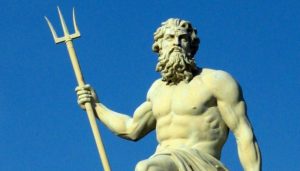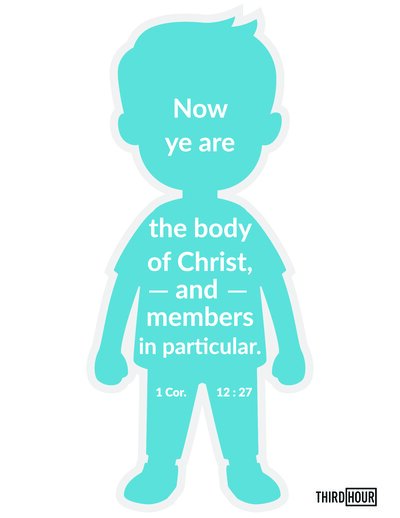“Ye Are the Body of Christ”
Food offered to idols (1 Corinthians 8; 10: 27, 28):
The Law of Moses forbade Israelites from partaking of “food offered to idols,” but why? The rhythm of a culture moves according to holidays and celebrations. As I write this, fall is coming. It’s a favorite season for many Americans because of a series of fall-to-winter holidays: Halloween, Thanksgiving, and Christmas. These holidays come along with family events, special decor, music, celebrations, and distinctive foods, which we grow to love.
In Corinth, the culture was permeated with vestiges of the state religion — the worship of multiple gods. Holidays and festivals dotted the year and many public and even family events took place at venues that either were halls adjoined to temples to pagan gods, or at places with the name of a patron god on the building.

So imagine you were the only convert to Christianity in Corinth, and your sister’s wedding came up. The family is gathering to celebrate at the hall attached to the Temple of Poseidon (the patron god of Corinth, called Neptune by the Romans). Paul is saying that you shouldn’t eat anything at the reception. Maybe you shouldn’t even go. Nor should you dance in the streets during the festival of Poseidon with everyone else in your family and town.
Note that some of the foods sacrificed to idols seemed pretty harmless. The Babylonians worshipped the sun, moon, and stars, and at certain times gathered as families to make little cakes to offer the heavens. A fun, family activity, right? But their idol worship included temple prostitution and even worse activities. The worship of the idol-god Molech included child sacrifice but may also have had some very nice sweet foods to enjoy.
Many festivals are joyous and fun. Imagine if when you joined The Church of Jesus Christ of Latter-day Saints you were then forbidden to participate in any of the year’s holidays or festivals that didn’t focus completely on Christ. Remove from your life the following (in America): New Year’s Eve and Day, Valentine’s Day, Independence Day, and Halloween. Also, totally ignore anything related to the Easter Bunny or Santa Clause. Please also avoid any venue associated with any other church other than your own. You won’t be attending your sister’s wedding at her Episcopal church chapel.
Let’s go back to the Law of Moses. The reason for the dietary laws and the law against eating anything sacrificed to idols was to separate the Israelites from their pagan neighbors; they were literally surrounded by pagans. When Peter was invited to preach to some Gentile believers in Caesarea, he confessed he had never entered a Gentile household in his life! The Lord understands the power of culture and how it can lure us away from having an eye single to the glory of God. This is a great discussion for your family or group. Culture is powerful and it’s hard to pull away from it.
Paul talks about his apostleship (1 Corinthians 9):
In talking about his calling to and dedication to his apostleship, Paul declares certain things in chapter 9:
- He has seen the Christ (v. 1)
- The “seal” of his apostleship is the dedicated believers (v. 2)
- Paul enjoys the fruit of his labors as he serves willingly (vs. 7 – 17)
- Paul doesn’t engage in priestcraft; he receives no material benefit from his calling (v. 18)
- Paul emphasizes his Jewishness and knowledge of Jewish law to bring along Jewish converts (v. 20)
- Paul understands and has compassion for the Gentile converts (v. 21)
The God of the Israelites was Christ (1 Corinthians 10):
Paul tries to convince the believers to be strong so that they won’t fail and fall like the Israelites in the wilderness under Moses. Paul says their rock was Christ, but they were pulled away by idolatry and sin — fornication, murmuring, and unbelief.
Cultural pressures, coming heresies, the holiness of the sacrament (1 Corinthians 11):
Paul talks about head coverings and when it is honorable for men and women to wear them. For instance, a man should uncover his head when praying or prophesying and the women should do the opposite. Every faith seems to have a tradition for this. In mainline Protestant and Catholic churches, women have traditionally covered their heads in church.

Paul talks about the relationship between men, women, and God, and then goes on to say that long hair on men is unnatural, but long hair on women is a glory for them.
In verse 19 Paul indicates that there are already heresies in the congregations. What are the sources of heresies that arise? This could be a great discussion. Here are some ideas:
- Influences from the culture of the world around the church
- Influences from the religions new converts came from
- The heretical ideas of charismatic people within the congregation
- Human logic that can’t grasp the things of God; people revise their ideas of the things of God to satisfy their own logic
Paul then goes on to talk about the sacrament and how we should prepare ourselves and repent in order to be worthy to partake:
“For he that eateth and drinketh , eateth and drinketh to himself, not discerning the Lord’s body.”
Spiritual gifts and miracles are found in the true church (1 Corinthians 12):
God is our source of power, and as we know from the Bible and the Book of Mormon, the charismatic gifts and miracles are present when the Holy Ghost is present.
Paul lists various gifts of the spirit and says that they all come from God. A good exercise might be to see how many spiritual gifts you can list that Paul does not mention. For example, I had a friend in the Church who seemed to be able to tell exactly what a person needed when she first encountered that person. She would then minister according to that impression. (I confess that I envy this gift. Paul does say to covet the best gifts.)
Paul then relates the well-known image that we all are one body and the head cannot say to the feet that it has no need for them. All are needed. When has your contribution initially seemed small but then turned out to be important to God’s work?
Charity is pure love (1 Corinthians 13):
Charity is the pure love of Christ and the central attribute of God. Without it, we can have all sorts of spiritual gifts and still fail to be worthy of exaltation. Paul lists some attributes of charity:
- long
- It’s
- It doesn’t envy
- It doesn’t vaunt itself
- It’s not puffed up
- It doesn’t behave itself
- her own
- It is not easily
- It thinks no evil
- It doesn’t rejoice in
- It rejoices in the
- It bears all things
- It believes all things
- It hopes all things
- It endures all things
it would be a great discussion to talk about these attributes. One, especially, is not so clear — “seeketh not her own.” This might be focusing on one’s self and one’s own desires (cool car, cool clothes, lots of recreational toys). Or it might mean seeking out people just like yourself (avoiding people of other faiths, economic status, social status, or ethnicities).
Lesson Resources:
churchofjesuschrist.org — Come Follow Me


